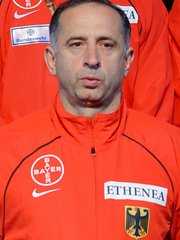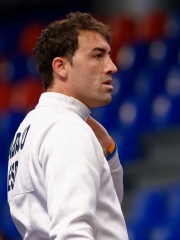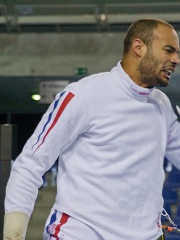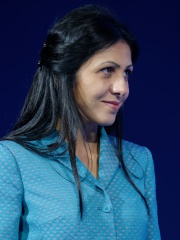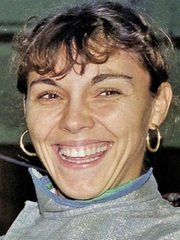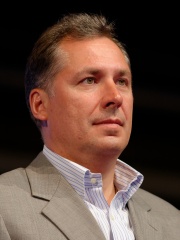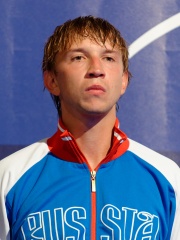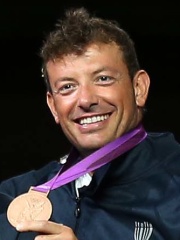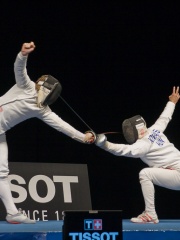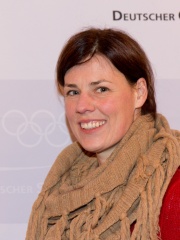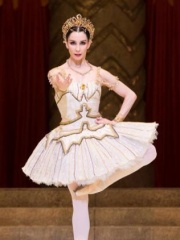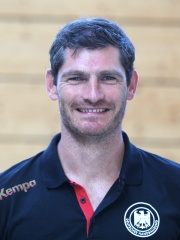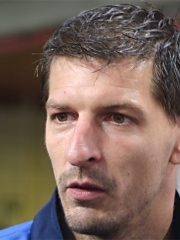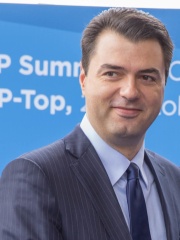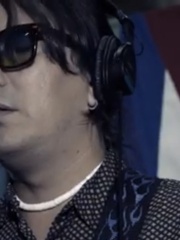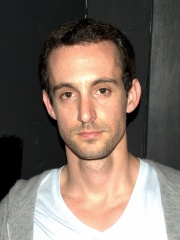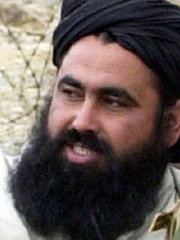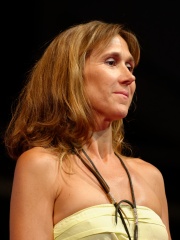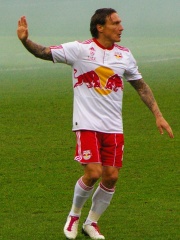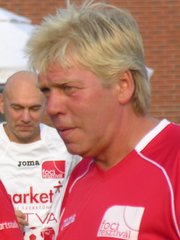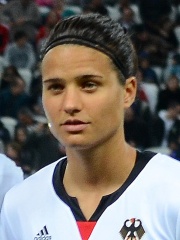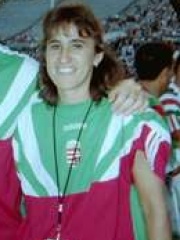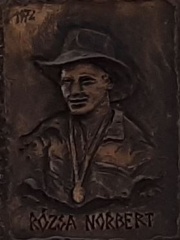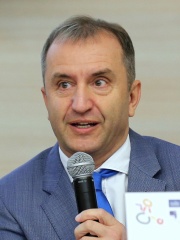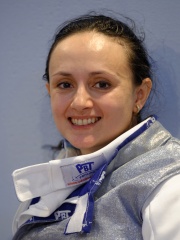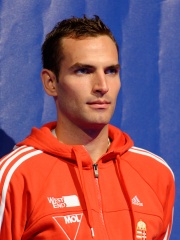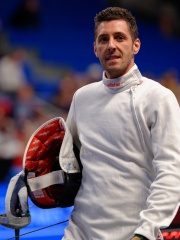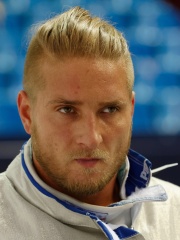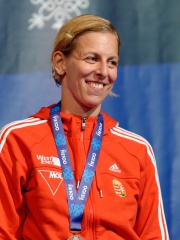Fencer
Géza Imre
1974 - today
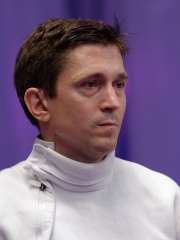
 Géza Imre
Géza Imre
Géza Imre (pronounced [ˈɡeːzɒ ˈimrɛ]; born 23 December 1974) is a Hungarian fencer, who has won four Olympic medals in the Épée competitions, a silver medal in 2004 Summer Olympics in Athens, a bronze medal in 1996 Summer Olympics in Atlanta and both a bronze and a silver medal in 2016 Summer Olympics in Rio de Janeiro. He was the 2015 world champion in men's épée in Moscow. He is the husband of Beatrix Kökény, a Hungarian handballer. Read more on Wikipedia
His biography is available in 22 different languages on Wikipedia. Géza Imre is the 179th most popular fencer (down from 177th in 2024), the 918th most popular biography from Hungary and the 32nd most popular Hungarian Fencer.
Memorability Metrics
Page views of Géza Imre by language
Among Fencers
Among fencers, Géza Imre ranks 179 out of 349. Before him are Nicolas Lopez, Vilmoș Szabo, José Luis Abajo, Fabrice Jeannet, Karina Aznavourian, and Claudia Grigorescu. After him are Stanislav Pozdnyakov, Aleksandr Beketov, Nikolay Kovalev, Luigi Tarantino, Iván Kovács, and Claudia Bokel.
Most Popular Fencers in Wikipedia
Go to all RankingsNicolas Lopez
1980 - Present
HPI: 45.90
Rank: 173
Vilmoș Szabo
1964 - Present
HPI: 45.82
Rank: 174
José Luis Abajo
1978 - Present
HPI: 45.82
Rank: 175
Fabrice Jeannet
1980 - Present
HPI: 45.73
Rank: 176
Karina Aznavourian
1974 - Present
HPI: 45.65
Rank: 177
Claudia Grigorescu
1968 - Present
HPI: 45.58
Rank: 178
Géza Imre
1974 - Present
HPI: 45.55
Rank: 179
Stanislav Pozdnyakov
1973 - Present
HPI: 45.30
Rank: 180
Aleksandr Beketov
1970 - Present
HPI: 45.27
Rank: 181
Nikolay Kovalev
1986 - Present
HPI: 45.26
Rank: 182
Luigi Tarantino
1972 - Present
HPI: 45.25
Rank: 183
Iván Kovács
1970 - Present
HPI: 45.09
Rank: 184
Claudia Bokel
1973 - Present
HPI: 44.95
Rank: 185
Contemporaries
Among people born in 1974, Géza Imre ranks 689. Before him are Markus Zberg, Tamara Rojo, Yuan Hua, Henning Fritz, Gábor Babos, and Arsi Harju. After him are Lulzim Basha, Diego Gutiérrez, Ivri Lider, Baitullah Mehsud, Kaori Mizuhashi, and Josie Ho.
Others Born in 1974
Go to all RankingsMarkus Zberg
CYCLIST
1974 - Present
HPI: 45.61
Rank: 683
Tamara Rojo
DANCER
1974 - Present
HPI: 45.61
Rank: 684
Yuan Hua
WRESTLER
1974 - Present
HPI: 45.59
Rank: 685
Henning Fritz
HANDBALL PLAYER
1974 - Present
HPI: 45.58
Rank: 686
Gábor Babos
SOCCER PLAYER
1974 - Present
HPI: 45.57
Rank: 687
Arsi Harju
ATHLETE
1974 - Present
HPI: 45.57
Rank: 688
Géza Imre
FENCER
1974 - Present
HPI: 45.55
Rank: 689
Lulzim Basha
POLITICIAN
1974 - Present
HPI: 45.55
Rank: 690
Diego Gutiérrez
SINGER
1974 - Present
HPI: 45.54
Rank: 691
Ivri Lider
SINGER
1974 - Present
HPI: 45.53
Rank: 692
Baitullah Mehsud
EXTREMIST
1974 - 2009
HPI: 45.53
Rank: 693
Kaori Mizuhashi
ACTOR
1974 - Present
HPI: 45.52
Rank: 694
Josie Ho
ACTOR
1974 - Present
HPI: 45.51
Rank: 695
In Hungary
Among people born in Hungary, Géza Imre ranks 918 out of 1,077. Before him are Tímea Nagy (1970), László Bodnár (1979), Éva Dónusz (1967), József Kardos (1960), József Csák (1966), and Gábor Babos (1974). After him are Dzsenifer Marozsán (1992), Erzsébet Kocsis (1965), Attila Repka (1968), Norbert Rózsa (1972), Mónika Lamperth (1957), and Friderika Bayer (1971).
Others born in Hungary
Go to all RankingsTímea Nagy
ATHLETE
1970 - Present
HPI: 45.69
Rank: 912
László Bodnár
SOCCER PLAYER
1979 - Present
HPI: 45.69
Rank: 913
Éva Dónusz
ATHLETE
1967 - Present
HPI: 45.68
Rank: 914
József Kardos
SOCCER PLAYER
1960 - 2022
HPI: 45.67
Rank: 915
József Csák
ATHLETE
1966 - Present
HPI: 45.67
Rank: 916
Gábor Babos
SOCCER PLAYER
1974 - Present
HPI: 45.57
Rank: 917
Géza Imre
FENCER
1974 - Present
HPI: 45.55
Rank: 918
Dzsenifer Marozsán
SOCCER PLAYER
1992 - Present
HPI: 45.48
Rank: 919
Erzsébet Kocsis
HANDBALL PLAYER
1965 - Present
HPI: 45.47
Rank: 920
Attila Repka
WRESTLER
1968 - Present
HPI: 45.33
Rank: 921
Norbert Rózsa
POLITICIAN
1972 - Present
HPI: 45.31
Rank: 922
Mónika Lamperth
POLITICIAN
1957 - Present
HPI: 45.31
Rank: 923
Friderika Bayer
SINGER
1971 - Present
HPI: 45.31
Rank: 924
Among Fencers In Hungary
Among fencers born in Hungary, Géza Imre ranks 32. Before him are Sándor Erdős (1947), György Nébald (1956), Imre Bujdosó (1959), Pál Szekeres (1964), Péter Abay (1962), and Bence Szabó (1962). After him are Iván Kovács (1970), Aida Mohamed (1976), Áron Szilágyi (1990), Gábor Boczkó (1977), Tamás Decsi (1982), and Emese Szász-Kovács (1982).
Sándor Erdős
1947 - Present
HPI: 50.67
Rank: 26
György Nébald
1956 - Present
HPI: 49.28
Rank: 27
Imre Bujdosó
1959 - Present
HPI: 49.28
Rank: 28
Pál Szekeres
1964 - Present
HPI: 48.10
Rank: 29
Péter Abay
1962 - Present
HPI: 47.50
Rank: 30
Bence Szabó
1962 - Present
HPI: 46.38
Rank: 31
Géza Imre
1974 - Present
HPI: 45.55
Rank: 32
Iván Kovács
1970 - Present
HPI: 45.09
Rank: 33
Aida Mohamed
1976 - Present
HPI: 43.62
Rank: 34
Áron Szilágyi
1990 - Present
HPI: 43.45
Rank: 35
Gábor Boczkó
1977 - Present
HPI: 42.68
Rank: 36
Tamás Decsi
1982 - Present
HPI: 42.04
Rank: 37
Emese Szász-Kovács
1982 - Present
HPI: 40.55
Rank: 38

